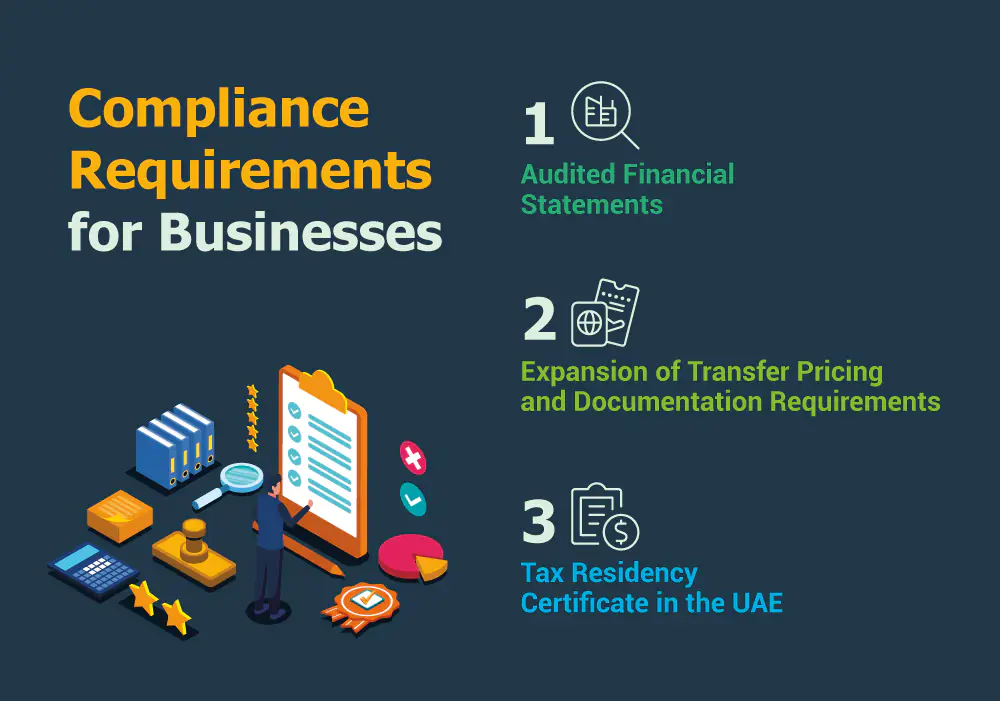The United Arab Emirates (UAE) has introduced a series of corporate tax rule changes set to take effect in 2025. These updates are part of the nation’s efforts to align with global tax standards while maintaining an attractive business environment. The changes are particularly important for companies operating in or planning to enter the UAE market, and compliance will be critical going forward.
UAE Announces Tax Update as part of its broader corporate tax reforms that began in 2023. This marked a significant policy shift in a country long known for its tax-free environment. Federal Decree-Law No. 47 of 2022 outlines the UAE’s corporate tax system, imposing a 9% tax on income that goes beyond AED 375,000.
The 2025 updates build upon the existing framework, introducing several refinements aimed at enhancing transparency, preventing profit shifting, and complying with international tax practices such as the OECD’s Base Erosion and Profit Shifting (BEPS) Pillar Two requirements.
The blog ‘UAE Announces Tax Update 2025: Key Changes Businesses Must Know’ outlines the key aspects of the
UAE tax update, along with a keen focus on the most relevant modifications that businesses should understand.
Table of Contents
Key Changes in Corporate Tax UAE for 2025
Domestic Minimum Top-Up Tax (DMTT)
One of the most significant inclusions in the 2025 UAE tax update is the Domestic Minimum Top-Up Tax (DMTT), effective January 1, 2025. This measure targets multinational enterprises (MNEs) with annual global revenues exceeding €750 million, falling under the OECD Pillar Two framework.
- Applicability
The DMTT is relevant for MNEs with consolidated global revenues of €750 million (approximately AED 3 billion) or above in any two of the previous four financial years.
- How it works
If an MNE’s effective tax rate in the UAE falls below 15%, the DMTT increases the tax liability to reach this minimum threshold.
- Impact
This change affects MNEs benefiting from lower tax rates or incentives, requiring them to reassess their tax strategies and reporting processes.
Actually, this move is part of the UAE’s focus on global tax reforms and will impact how MNEs structure their operations in the region.
Also Read: How to Claim a VAT Refund in the UAE: Step-by-Step Guide 2025
Corporate Tax for Free Zone Businesses
Free zones remain a significant part of the UAE’s business scenario, providing tax incentives to attract investment. Under the new tax rules, free zone businesses can still qualify for a 0% corporate tax rate, but strict conditions apply:
- Qualifying Free Zone Persons (QFZP)
From activities carried out within the free zone or with companies based outside the UAE. Income generated from transactions with the mainland UAE could be subject to the usual 9% tax rate.
- Substance Requirements
Free zone entities must demonstrate a physical presence and conduct core income-generating activities locally.
Free Zone companies should now review their operations to check if they still meet the necessary criteria to enjoy tax exemptions.
Also Read: What Are the Different Types of Audit Reports?
Mandatory Corporate Tax Registration in the UAE
The UAE’s tax update 2025 mandates corporate tax registration with the Federal Tax Authority (FTA) for all taxable entities. This requirement applies to:
- Mainland businesses
All companies involved in commercial, industrial, or professional activities
- Free zone businesses
This includes those eligible for the 0% corporate tax rate.
- Individuals
People earning more than AED 1 million per year from business must register by March 31, 2025.
- Foreign entities
Companies with a fixed presence or establishment in the UAE.
Non-compliance carries penalties of up to AED 10,000, making timely registration critical for all businesses under the corporate tax in UAE.
Also Read: How To Choose The Best Audit Firms in Dubai – UAE
Revised General Anti-Abuse Rules (GAAR)
As part of the latest tax updates in the UAE, the Federal Tax Authority (FTA) is continuing to strengthen the General Anti-Abuse Rules (GAAR) outlined in Article 50 of the Corporate Tax Law. These rules are designed to stop the misuse of the tax system through deals that don’t have real commercial purpose and are mainly done to gain tax benefits.
GAAR permits the FTA to recharacterize or disregard transactions that are determined to have been entered into with the main purpose of obtaining tax benefits, without a valid business rationale. Common cases include:
- Dividing business activities to become eligible for small business relief.
- Structuring related-party transactions solely to reduce taxable income.
The FTA evaluates such arrangements based on:
- Economic substance
- Timing and financial effect
- Consistency with the intent of tax legislation
If the FTA identifies that a transaction was undertaken primarily for tax avoidance, it may adjust the taxable income accordingly or deny tax benefits such as deductions or exemptions.
Also Read: Documents Required for VAT Registration UAE
Compliance Requirements for Businesses

Audited Financial Statements
The UAE tax rule reforms require businesses to maintain audited financial statements compliant with International Financial Reporting Standards (IFRS). This applies to:
- Taxable entities filing corporate tax returns whose turnover exceeds AED 50 million.
- Qualifying Free Zone Persons
However, all other entities are required to maintain financial statements that are compliant with International Financial Reporting Standards (IFRS).
For accurate tax reporting and avoiding penalties, proper financial records are essential.
Also Read: The Three Golden Rules of Accounting
Expansion of Transfer Pricing and Documentation Requirements
Transfer Pricing (TP) continues to be a crucial aspect of the corporate tax framework in the UAE, and the 2025 updates introduce more defined thresholds and compliance obligations.
Under the updated rules, UAE-based businesses engaged in transactions with related parties or connected persons must adhere to OECD-aligned TP principles, particularly the arm’s length principle, ensuring that all intercompany transactions reflect fair market value.
Also Read: Business Setup in Dubai: The Ultimate Guide to Company Formation in UAE
TP Documentation:
The following entities are required to prepare and maintain comprehensive TP documentation:
- Multinational Enterprise (MNE) groups with consolidated global revenues exceeding AED 3.15 billion must submit a Master File and Local File in accordance with OECD guidelines.
- UAE companies with local revenue over AED 200 million also need to follow these documentation rules.
These files must provide detailed disclosures on the nature of intercompany transactions, pricing methods, and financial analyses supporting arm’s length compliance.
Also Read: How to Find TRN Number and Perform TRN Verification in UAE?
Tax Residency Certificate in the UAE
The tax residency certificate UAE has gained notable significance with the introduction of corporate tax. Issued by the Ministry of Finance, it confirms whether an individual or business is considered a tax resident in the UAE.
- Purpose: A TRC helps businesses make use of double tax agreements, prevent being taxed twice, and show proof of residency to overseas tax authorities.
- Eligibility: Applicants must maintain a physical presence and conduct business activities in the UAE.
For companies with international operations, obtaining a TRC is a strategic step in tax planning.
Also Read: What is ICV Certificate in Dubai-UAE and How to Get It?
Exemptions and Reliefs
The UAE Corporate Tax Law provides specific exemptions and relief measures to support economic activity and minimize the tax burden on certain sectors and entities.
Also Read: How to Register for Corporate Tax in UAE Using Emaratax
Government Entities and Public Benefit Organizations
Entities that are wholly owned and controlled by the government and engaged in sovereign or public functions are fully exempt from corporate tax. In addition, public benefit entities such as charities and nonprofit organizations can also qualify for exemption, subject to approval and registration with the Ministry of Finance.
Also Read: Top 10 Best Accounting Software UAE – Dubai
Natural Resource Businesses
Businesses involved in the extraction of natural resources (oil, gas, and minerals) are taxed at the emirate level and remain exempt from federal corporate tax. However, they must still comply with federal tax registration and reporting obligations if they conduct non-extractive activities.
Also Read: MIS Report: Definition, Importance, Types, and Examples
Small Business Relief
To support startups and SMEs, the UAE offers Small Business Relief under Article 21. Businesses with revenues not exceeding AED 3 million per annum in the current and preceding tax periods can elect to be treated as having no taxable income. This relief is applicable until December 31, 2026, and is intended to reduce compliance obligations for small-scale enterprises.
Businesses are encouraged to evaluate eligibility for these exemptions or reliefs as part of their annual tax planning to optimize their tax liability and administrative load.
Also Read: How to Get an Audit License in UAE
Implications for Businesses in the UAE
The UAE announces new tax rules for 2025, creating both compliance demands and opportunities for strategic tax optimization.
Increased Compliance Burden
The introduction of the Domestic Minimum Top-Up Tax (DMTT), mandatory tax registration, and expanded Transfer Pricing requirements necessitate a more structured approach to corporate tax. Businesses must invest in internal systems, ensure proper documentation, and seek qualified tax advisory support to avoid penalties.
Free Zone Compliance
Free Zone companies must meet all criteria to qualify as Qualifying Free Zone Persons (QFZPs) to continue benefiting from the 0% corporate tax rate. Any non-qualifying income may be taxed at the standard 9%, increasing the need for clear segregation of income streams.
Global Tax Alignment
With the UAE implementing BEPS Pillar Two measures through the DMTT and strengthening GAAR provisions, multinational enterprises (MNEs) must reassess their structures, especially where global consolidated revenues exceed €750 million.
Proactive tax governance is now essential to remain compliant and tax-efficient.
Also Read: Corporate Tax UAE: Everything You Need to Know in 2024
Stay Ahead with Kreston Menon
The UAE’s tax environment is changing, and staying updated is important than ever. You need a partner who understands both the local rules and the bigger global picture. That’s where Kreston Menon comes in. Being the top provider of corporate tax services in Dubai, we help you keep up with the latest tax reforms and make confident, right decisions for your business. Mainly, we support you with:
- Corporate tax registration: We will handle your registration process from start to finish, and thus, you will meet all FTA requirements.
- Corporate Tax Compliance and Return Filing: We help ensure you meet all corporate tax requirements, including calculating your tax and submitting accurate returns.
- Tax residency certificate (TRC) assistance: When you need a TRC to benefit from the UAE’s double tax treaties, we will guide you through the process.
- Transfer Pricing assessment and benchmarking exercise: We assist you with the assessment of Transfer Pricing Compliance of the related party transactions and also perform a benchmarking exercise.
- Transfer pricing documentation: We help you prepare master and local files that meet OECD standards and satisfy FTA expectations.
- Advisory on Free Zone and DMTT compliance: Our experts will assess your business model and make sure that you qualify for available tax benefits.
And a lot more…
If these changes feel a bit too much, don’t worry, Kreston Menon’s experts are here to help you make sense of it all.

